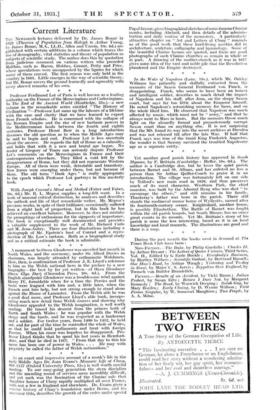A monument to Owen Glendower was unveiled last month in
North Wales, and the ceremony, under Sir Alfred Davies as chairman, was largely attended by enthusiastic Welshmen. Here, then, is confirmation of Professor J. E. Lloyd's reference to him as the Welsh national hero in the preface to a new biography—the best by far yet written—of Owen Glendower (Owen Glyn Duff) (Clarendon Press, 10s. 6d.). From the English standpoint Glendower was a troublesome rebel against Henry IV, formidable when for a time the Percies and the Scots were leagued with him and, a little later, when the French sent him help, but not strong enough to stand alone against the House of Lancaster. From the Welsh side he was a good deal more, and Professor Lloyd's able book, incorpo- rating much new detail from Welsh sources and showing why Glendower appealed to the Welsh imagination, is well worth reading. He traced his descent from the princes both of North and South Wales ; he was popular with the Welsh clergy and the bards, and he was respected as a landowner and a soldier. For twelve years, from 1400 to 1412, he held out, and for part of the time he controlled the whole of Wales, so that he could hold parliaments and treat with foreign Powers. When his cause was hopeless he disappeared. Pro- fessor Lloyd thinks that he spent his last years in Hereford- shire, and that he died in 1417. " From that day to this his name has been one of power in Wales. . . . He may with propriety be called the father of Welsh nationalism."






































 Previous page
Previous page